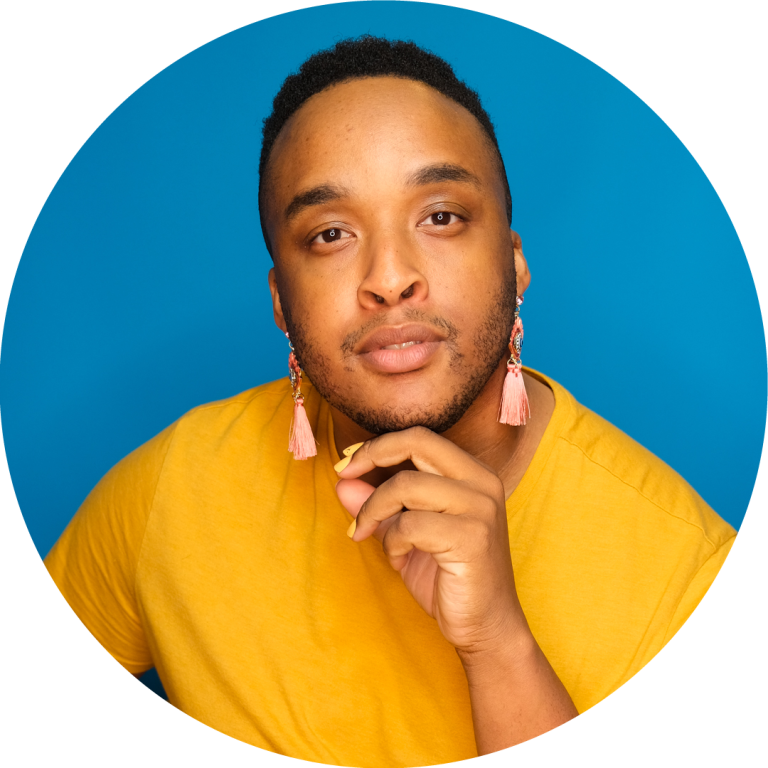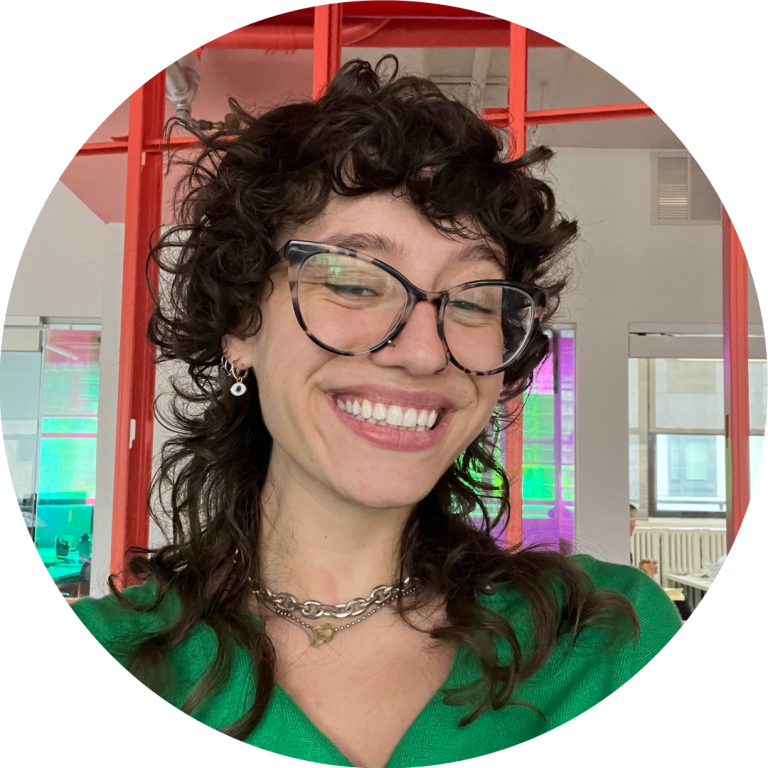
Insights
There is No Singular Way to be Nonbinary
-
July 14 is International Nonbinary People's Day.
-
According to the National Center for Transgender Equality, ‘nonbinary’ is a term people use to describe genders that don’t fall into one of these two categories: male or female.
-
To celebrate this occasion, Outright International is spotlighting the experiences of two nonbinary people.
-
There is no singular way to be nonbinary, and gender diversity should be celebrated in its many unique expressions and identities.

TAYLOR ALXNDR
TAYLOR ALXNDR, who uses they/she pronouns, is a DIY musician, drag performer, multimedia artist, community organizer and founder of the House of ALXNDR. They identify as nonbinary, transfemme and agender, were born and raised in Georgia and currently reside in Atlanta. ALXNDR said that before moving to Atlanta in 2011, there was no visible LGBTIQ community where they lived, and being trans, nonbinary or even cisgender was not commonly discussed.
“The idea of being trans and nonbinary was introduced to me in 2011, and it just clicked based on how I had felt pretty much all of my life,” ALXNDR said.
This was also around the time ALXNDR said she started getting into drag.
“Having that educational space and all that, and also that kind of performance space, allowed me to really just explore gender in a way I had never done before,” ALXNDR said. “And so that’s when I started identifying as nonbinary and agender. Transfemme kind of came a little bit later as I kind of dug deeper into how I really identified and how I felt according to my gender expression and whatnot.”
When ALXNDR first came out as nonbinary, they only used they/them pronouns.
“I was just using they/them just because I felt completely devoid of gender, where I felt like gender just wasn't a necessary thing for me to align with. I wanted to be completely neutral,” ALXNDR said. “He/him just never felt comfortable. It just never felt like the right place for me to situate myself. She/her, for a long time, felt like something I didn't deserve yet, I guess because a lot of the people around me who were transfemme or trans women or feminine nonbinary people presented a certain kind of way. A lot of them were actively taking estrogen and things like that or doing gender-affirming surgeries and whatnot. And I just felt, at that time, because of my lack of education and nuance, that I needed to do those things and perform gender in a certain kind of way to earn she/her or earn transfemme.”
According to ALXNDR, drag allowed her to work through these ideas.
“For drag queens, a lot of us just go by she/her in and out of drag, even some drag queens who are cisgender outside of drag,” ALXNDR said. “And so drag allowed me to be like, ‘You know what, I do deserve these pronouns. They feel comfortable, they make me happy, and I shouldn't have to perform anything a certain kind of way to earn them. Pronouns aren't earned. They're just outright there.’”
ALXNDR is also the co-founder and executive director of Southern Fried Queer Pride (SFQP). The organization started as meetups at coffee shops and in backyards to help young Black and Brown folks in Atlanta find community when they were too young to access bars, which were otherwise a main source of community interaction. SFQP began hosting the annual Southern Fried Queer Pride Festival in 2013. Throughout the year, SFQP hosts events, from potlucks and pop-up thrift shops, to ballroom events and community workshops.
“We also had a unique kind of understanding that as queer people living in the South, we're often written off, we're not represented in media… The South, the Southeast, has the largest population of LGBTQ people in the country… So we wanted to create a space where we could have southern pride, pride for ourselves,” ALXNDR said.
ALXNDR said that one of her favorite parts about being nonbinary is being around other nonbinary and trans people because that is where she feels the happiest and most affirmed. She also said she loves being nonbinary because she feels free to express herself any way she sees fit.
“I think being nonbinary is still a very radical identity to have because we're still challenging mainstream notions of gender and gender expression, which even some members in our own community are still perpetuating,” ALXNDR said. “So it's an identity that brings so much joy, but it also brings a lot of challenges obviously because of the way that the world works, but I wouldn't trade it for anything. I'm very thankful for finding an identity that felt like home because I know lots of people who spend so much of their life still trying to find something that feels like home.”
Still, ALXNDR admits that being nonbinary has its difficulties.
“Feeling sometimes like I'm not enough, or I'm not trans enough, or I'm not nonbinary enough, or I'm not performing gender in a way that other trans people can see,” ALXNDR said. “I've slowly learned to not fall into that kind of pithole because it's just never productive, and it's not realistic.”
When ALXNDR first started hearing about the recent drag bans and trans-antagonistic legislation in the United States, it did not surprise them.
“It is a political tactic of using trans, nonbinary, gender-nonconforming individuals as scapegoats to distract people from the actual real issues that we have, which is like infrastructure, healthcare and general care for human beings. … I think in the long run, it’s going to be seen as a silly little blip in the political history of the moment. But right now, it does feel kind of heavy,” ALXNDR said.
ALXNDR gave advice for people wanting to be better allies to nonbinary and trans people.
“Just creating space for the trans and nonbinary people in your life to explore and feel things,” ALXNDR said.
For ALXNDR, being nonbinary means endless possibilities.
“Being nonbinary, just like being and identifying as queer, I think is understanding the multitudes that we contain as human beings and allowing ourselves individual freedom to navigate that however we see fit,” ALXNDR said. “Life is worth living, and why should we limit ourselves or put ourselves in boxes?”

HAZEL OLSON-DORF
Hazel Olson-Dorf works as a content creator for Outright. They use they/them pronouns and identify as trans and nonbinary. Olson-Dorf said identifying as nonbinary aligned with how they felt about themself and how they wanted to be seen by others.
“Being nonbinary to me is about really having a conversation with yourself and being honest about … how you see yourself and accepting and loving and embracing and celebrating your true feelings about yourself, regardless of what you've been told by other people you should or shouldn't be,” Olson-Dorf said. “It's about creating yourself and loving it, and it's about saying that the binaries that you've been handed don't fit you.”
Olson-Dorf said they grew up around a lot of queer and genderqueer people and always thought of gender identity as something that was chosen. One of their most significant role models is their mother, who uses she/her/TBD pronouns and identifies as butch, according to Olson-Dorf.
“She … is embodying that in-between space while still using the language that makes her feel comfortable,” Olson-Dorf said. “And I'm not saying that she's nonbinary, because that’s not how she identifies, but I think that there's a lot of overlap in being fluid with one's identity that I understood through her.”
Olson-Dorf spoke about the violence against trans and nonbinary people in the United States and worldwide.
“It’s really hard to be living in a country where our actual existence in public space and in private space is being chipped away actively, and to feel like it's just another political game for some other person is just maddening, because these are our lives, right? … People are scared of us, and that is having a literal physical backlash on our lives,” Olson-Dorf said. “But they're scared because what we have and what we know is powerful.”
According to Olson-Dorf, the easiest way to be an ally to nonbinary people is to use their pronouns. Olson-Dorf said that if an ally was struggling to shift their pronoun usage, they should think deeply about how that person identifies, and try to override their previous understanding with that person’s current identity.
“You might slip up, but if you really, at the core, understand that person and see that person and know that person as how they identify, it will be easier for you to use their pronouns,” Olson-Dorf said.
Olson-Dorf believes that the more difficult part of being an ally to trans, queer and nonbinary people is undoing the narrative that gender is fixed.
“There are certain things in one's life that never stay the same, so why are we applying that logic to gender? Every person is learning and growing as they live. Every person is continuing to hopefully have a conversation internally with themselves about who they want to be, and how they want to act, and how they want other people to see them. And we need to apply that same logic to gender. … You just look back in history, and you realize that people have tried to erase our existence, but we're still here,” Olson-Dorf said.
Olson-Dorf said that the act of self-creation was the best part about being trans and nonbinary.
“It's a scary thing for people to realize that when you understand everything as being fluid, including your identity, including your gender, that does bring in a lot of ‘chaos’ into your life,” Olson-Dorf said. “But there's also something really beautiful about understanding yourself as not being a fixed entity. And there's something really, really, really beautiful about being creative with what you can be when you throw away all the things that you've been told you're supposed to be. What are you creating for yourself? It's a beautiful infinity, right? The best thing that's ever happened to me is realizing that I can create my own self.”

Take Action
When you support our research, you support a growing global movement and celebrate LGBTIQ lives everywhere.
Donate Now